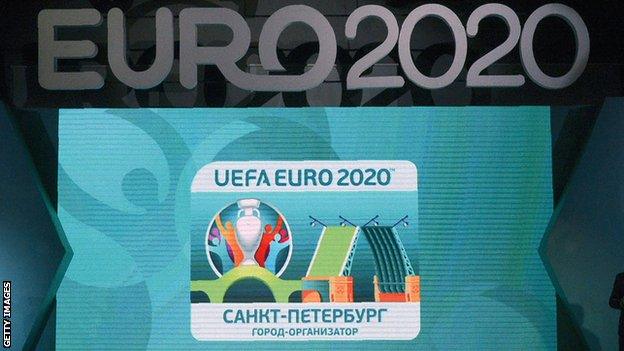Euro 2020: Russia's staging of games under threat after Wada recommends ban
- Published

St Petersburg was confirmed as a Euro 2020 host city in 2014
Russia's staging of games at Euro 2020 could be under threat after a World Anti-Doping Agency (Wada) committee recommended the country be banned from hosting sports events for four years.
Russia could also be banned from next year's Tokyo Olympics - having also been excluded from the 2018 Winter Games - and other major competitions.
Wada's compliance review committee (CRC) recommended a raft of measures after declaring the Russian Anti-Doping Agency (Rusada) non-compliant over inconsistencies in anti-doping data.
One of the proposals is to withdraw the right to host an event already awarded unless it's "legally and practically impossible".
St Petersburg, Russia's second-largest city, is a venue for Euro 2020 group games - with Wales potentially playing two of their matches there - and a quarter-final tie that could possibly involve England.
Wada's executive committee will consider the recommendations and make the final decision at a meeting in Lausanne, Switzerland, on 9 December.
"We are plunging, for the next four years, into a new phase of Russia's doping crisis," Russia's anti-doping chief Yuri Ganus told AFP.
"There are a lot of problems in sports here, but the most difficult and tragic thing is that our athletes have become hostages of the actions of our sports officials.
"We need to push through real changes. We need new sports leaders."
However, Russian foreign minister Sergei Lavrov said he believed that the ban was part of a wider global campaign to undermine his country.
"There are those who want to put Russia in the position of someone in defence, the position of the accused," he told the RIA Novosti news agency.
"In essence, it is accused of everything and everywhere, regardless of the international field - conflicts, economics, energy, gas pipelines, military trade - everywhere Russia is violating something."
What are the key recommendations?
The CRC made its recommendations based "in particular" on a forensic review of inconsistencies found in some of the data obtained by the agency from the Moscow Laboratory in January 2019.
The committee concluded that there is "an extremely serious case of non-compliance with the requirement to provide an authentic copy of the Moscow data, with several aggravating features".
CRC's "strong proposed consequences" include:
Russia may not host, or bid for or be granted the right to host any major events for four years
Russia may not bid for the right to host the 2032 Olympic and Paralympic Games, irrespective of whether the bidding takes place during or after the four-year period
The country's flag may not be flown at any major event staged in the four-year period
Russian athletes and their support personnel may only participate in major events staged in the four-year period where they are able to demonstrate that they are not implicated in any way by the non-compliance. In such circumstances these athletes would compete as neutrals
Where the right to host a major event in the four-year period has already been awarded to Russia, the signatory must withdraw that right and re-assign the event to another country, unless it is legally or practically impossible to do so
The four-year period would start "on the date on which the decision that Rusada is non-compliant becomes final".
The International Olympic Committee called the inconsistencies in the doping data from Moscow a "flagrant manipulation...an attack on the credibility of sport itself and...an insult to the sporting movement worldwide."
US Anti-Doping Agency head Travis Tygart said: "It's great the CRC has recognised the egregious conduct of Russia toward clean athletes and now let's all hope the Wada executive committee uses the same resolve to ensure clean athletes are not again sold down the river and actually supports this unfortunate but necessary outcome."
Rusada was initially declared non-compliant in November 2015 after a Wada-commissioned report by sports lawyer Professor Richard McLaren alleged widespread corruption that amounted to state-sponsored doping in Russian track and field athletics.
A further report, published in July 2016, declared Russia operated a state-sponsored doping programme for four years across the "vast majority" of summer and winter Olympic sports.
In 2018, Wada reinstated Rusada as compliant after the national agency agreed to release data from its Moscow laboratory from the period between January 2012 and August 2015.
However, positive findings contained in a version courtesy of a whistleblower in 2017 were missing from the January 2019 data, which prompted a new inquiry.